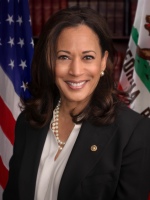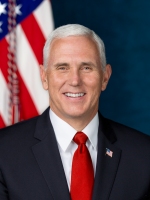Previously published at GBH News.
If, as James Nance Garner once said, the vice presidency “isn’t worth a bucket of warm spit” (and, uh, no, he probably didn’t quite put it that way), then the quadrennial vice presidential debate falls below even that low bar. The memorable moments over the years, such as they were, can be summarized as “You’re no Jack Kennedy,” “Who am I? Why am I here? ” and Sarah Palin winking at the camera.
But given the gerontological cast of the two presidential candidates, tonight’s encounter between Vice President Mike Pence and his Democratic challenger, Sen. Kamala Harris, promises to be more significant than usual. Pence’s boss, President Donald Trump, is 74 and is currently recovering from COVID-19. The top of the Democratic ticket, former Vice President Joe Biden, is 77, and though his health seems fine, he would be the oldest person by far to be elected president. Thus Pence and Harris both give new meaning to the phrase “a heartbeat away from the presidency.”
The presidential campaign itself has been marked by more improbable twists and turns than a self-published mystery novel — from impeachment to stunning revelations about Trump’s taxes, from a worldwide pandemic to economic collapse. In recent days, though, with early voting already under way, it’s begun to seem like the final plot developments are slipping into place.
First, Trump’s catching COVID seems like a metaphor for his entire horrendous response to a disease that has now killed more than 210,000 of his fellow Americans. Just as with the country as a whole, he has shown blatant disregard for those in his immediate circle, resulting in what amounts to a mini-pandemic ripping through the White House and among top Senate Republicans.
He held indoor and outdoor events for his Supreme Court nominee, Judge Amy Coney Barrett, at which few people wore masks. Because of characteristic obfuscation and lying by him and his staff, we don’t know exactly when he was diagnosed or how sick he really is. He put his own Secret Service agents at risk by cruising around Walter Reed Hospital.
And let’s face it. Even though no decent person wants Trump to become seriously ill, it sent a terrible message to the country for him to announce, as he did on Monday after being discharged from the hospital, “Feeling really good! Don’t be afraid of COVID. Don’t let it dominate your life.” Not only is that an insult to the dead and those still struggling with the after-effects of the virus, but it’s also not the way to encourage mask-wearing and social-distancing.
Second, Biden may be on his way to a decisive if not overwhelming victory. Among media observers, the narrative in place since March has been that if Trump loses, it will be because of COVID and the economy. Don’t you believe it.
According to the RealClearPolitics polling average, Biden has held a steady lead over Trump since October 2019, which makes sense given that Trump is a historically unpopular president. That lead has been widening in recent days, with a Wall Street Journal/NBC News poll conducted after the first chaotic debate putting Biden ahead by a margin of 53% to 39%.
Of course, it’s not over till it’s over. Biden’s lead in the handful of states that will determine whether he can win an Electoral College victory is narrower than it is in the national polls, and we still don’t know how Republican efforts to suppress the vote will play out, or if with Russian propaganda will have an effect.
The most likely scenario, though, is that we’ll find ourselves looking back after the votes are tallied and see that our belief that Trump would somehow pull one last, ginormous trick out of a hat was grounded more on flashbacks to 2016 than on the last four years. Many of us have watched in amazement as Trump’s approval rating has never dipped much below 40%. The corollary, of course, is that it’s never risen much above that, either. Almost from the day he was inaugurated, more than half the country has has disapproved of Trump’s performance as president. And between now and Nov. 3, they can register that disapproval at the polls.
But first comes the encounter between Pence and Harris. Pence is easily caricatured as the ultimate Trump suck-up whose base doesn’t extend much beyond the evangelical vote. Four years ago, though, Hillary Clinton’s running mate, Sen. Tim Kaine, couldn’t put a dent in him. Pence is better at this sort of thing than his detractors imagine.
Fortunately for the Democrats, Harris is a considerably more nimble debater than the hapless Kaine. At one time I thought she might be her party’s strongest presidential candidate, but her uneven campaign took her out of contention. Despite that, she is a first-rate political talent, smart, personable and — the key, given Biden’s age — credible as a possible president.
Given that Biden, if he wins, would be 82 by the time his first term ends, it seems more than likely that both Harris and Pence will be running for president four years from now. Look at tonight as a rehearsal for 2024 — played out in the midst of one of the worst crises our country has experienced.
Talk about this post on Facebook.









